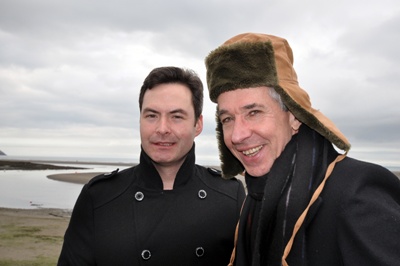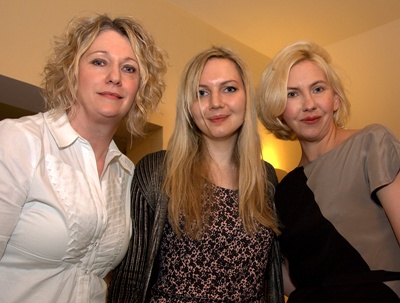"There's Nothing New Under the Sun"
10.03.10
Gellifawr cottages come as something of a surprise; four miles or so along a back road out of Newport (Pembs, not Gwent), remote farm buildings and the odd ruined bothy appear to be the only dwellings. But Gellifawr consists, almost, of a hamlet; the main building, a nineteenth-century stone farmhouse, houses a bar and restaurant and conference room and the many outbuildings comprise the comfortable guest accomodation. Carn Ingli looks down over it all. There are white doves purring on the roofs and some noble horses. It's impressive, as Pembrokeshire always is, and was the venue for an Academi conference entitled New Narratives: "Sometimes retelling is better", wrote Peter Finch in the promotional stuff, "it is the way the retelling goes that makes it new. Have all the words we ever need already been said?"
Tom Anderson kicked the weekend off with a discussion of travel writing; asking whether the genre should contain a fictive element. He was a great talker, and introduced the first instance of synchronicity that seemed, for me, to characterise the weekend when he mentioned Severin's book, In Search of Moby Dick, (this was Pembs; old forces prevail) — the model whale used in the John Huston film is sunk off the coast of nearby Newport. He began with a reference to Tony Blair, the arch dissembler, the man for whom the world inside his head is the only reliable reality, the man who makes his own truths; and ended with a tale of chasing a tornado across America. I can't remember how he linked the two, but he did; circuitously, but cleverly and convincingly too.
Joe Dunthorne spoke about adapting his novel Submarine for the screen, and appeared alongside Craig Roberts, who plays Oliver Tate, who, Joe said, is "50% me", and expressed gladness that the film contains no big stars, because then they would need to play two roles — the character and themselves — which was interesting. Craig was confident and talkative (of course, he's an actor), and Joe, affectionately, referred often to Craig's "funny face", which I couldn't disagree with. Both were warm and engaging. Richard Ayoyede — Moss in The IT Crowd — has directed the film. I'm tingling, now, to see it.
Damian Walford Davies took us in a minibus down to Parrog ("where God goes on holiday"). He talked sensitively and intelligently about Russell Celyn Jones's latest book, the first in a series of Mabinogion "retellings" published by Seren (Russell himself being unable to attend). I felt myself sinking into deep Welshness here. The series will be our "new White and Red Books", Damian said.
Damian Walford Davies and Ifor Thomas (Photo© Peter Finch)
The talk was of liminal spaces so "beloved of the Celtic mind"; this was skillfully related to Russell's treatment of surfing in his work, which echoed Tom's opening talk. At Damian's mention of bird symbology, I watched a peregrine behind him skim the surface of a lake. The part of my mind that searches for symbols went into overdrive. Sparks fizzed out of my ears.
Back at Gellifawr, Ifor ap Dafydd guided us through the National Library's digital archives programme. Ifor made an important distinction between "born digital" and "digitised"; the former is work written straight on to a screen, the latter is printed material that is transformed into a digital file. This programme is an attempt to hold on to the physical ephemera of an author's writing life in an electronic age, an age which is more disposable than the print era. So many web pages are lost due to their owners discontinuing payment to the web hosts, or just losing interest, whereas paper lasts many centuries. Cursors are pens now, and pixels are ink, but the concrete artefact retains central importance. Ifor stressed this.
Kathryn Gray, Joe Dunthorne, and Carrie Etter gave a poetry reading, with Peter Finch stepping in, briefly but strongly, for the absent Gillian Clarke. Carrie, one of Seren's rising stars, had a tremendous breathy voice and a compelling delivery, but why, these days, do all poets make their lines go questioningly up at the end? And with that three, beat, close? It's as if they're following guidelines. Still, the three were very good and the reading was a powerful way of bringing the first day to an end. There were so many "mmmm"s from the audience I thought I was in a Bisto commercial. Ifor Thomas, in a pink stetson, MC'd the literary pub quiz after we'd all eaten and drunk and were still drinking. All I remember is laughing a lot.
Next morning's talk on micro-fiction hosted by Kathryn Gray, with Deborah Kay Davies and Holly Howitt, touched on the publication The Flash, Dan Rhodes's Anthropology and the quick hit of literature in the days of Twitter (Twitlit, Twiterature). It's the new poetry in that everyone wants to write it, but few seem to read it; Holly's editing an anthology of micro-fiction for Cinnamon, and she's received 4000 submissions, which Deborah found "terrifying".

Deborah Kay Davies, Holly Howitt and Kathryn Gray (Photo© Stanislaw Szypowski)
The problem, of course, is that micro-fiction looks easy, but it's not. I think it was Shaw who apologised for writing such a long letter, but explained that he didn't have the time to write a shorter one. The brilliant phrase, "sudden fiction" was aired.
Malcolm Pryce and myself spoke about Aberystwyth, hosted entertainingly and perceptively by Ifor Thomas, and for the closing session Jon Gower spoke to Tom Anderson and Kathryn Gray about the conference's overriding theme. They looked at the "lyrical essay" as written by Sebald et. al., and various other unfamiliar forms, and Jon felt the new young voices appearing in Wales were a hopeful sign, but Kathryn cautioned, rightly, not to equate "new" with "young". "There is a cacophonous and symphonic chorus of voices in Wales that are all expressing themselves", Jon said. Kathryn backed this up by stating that "you know you have a literature that's going places when it can't be categorised." Which would've been a fine note to end the conference on, but Jon bettered it: "There is nothing wrong, in having a conference called New Narratives, that ends with the observation that there's nothing new under the sun."
With writers varying in age from the twenties (Dunthorne) to the eighties (Stan Barstow, who was a guest, and who I felt privileged to meet), and in such deeply antiquated surroundings, it was a variegated and stimulating conference. Carn Ingli nodded in approval.
Niall Griffiths